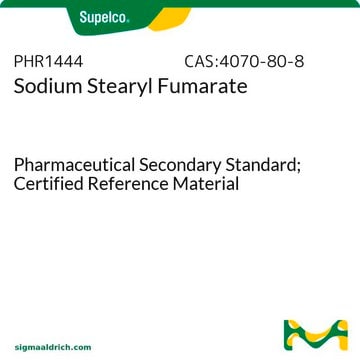07429
Succinate de diéthyle
analytical standard
Synonyme(s) :
Butanedioic acid, diethyl ester, Ethyl succinate, Succinic acid, diethyl ester
About This Item
Produits recommandés
Qualité
analytical standard
Niveau de qualité
Densité de vapeur
6 (vs air)
Pureté
≥99.5% (GC)
Durée de conservation
limited shelf life, expiry date on the label
Technique(s)
HPLC: suitable
gas chromatography (GC): suitable
Indice de réfraction
n20/D 1.42 (lit.)
n20/D 1.420
Point d'ébullition
218 °C (lit.)
Pf
−20 °C (lit.)
Densité
1.047 g/mL at 25 °C (lit.)
Application(s)
cleaning products
cosmetics
environmental
flavors and fragrances
food and beverages
personal care
Chaîne SMILES
CCOC(=O)CCC(=O)OCC
InChI
1S/C8H14O4/c1-3-11-7(9)5-6-8(10)12-4-2/h3-6H2,1-2H3
Clé InChI
DKMROQRQHGEIOW-UHFFFAOYSA-N
Vous recherchez des produits similaires ? Visite Guide de comparaison des produits
Description générale
Application
Code de la classe de stockage
10 - Combustible liquids
Classe de danger pour l'eau (WGK)
WGK 2
Point d'éclair (°F)
208.4 °F - closed cup
Point d'éclair (°C)
98 °C - closed cup
Équipement de protection individuelle
Eyeshields, Gloves, type ABEK (EN14387) respirator filter
Faites votre choix parmi les versions les plus récentes :
Déjà en possession de ce produit ?
Retrouvez la documentation relative aux produits que vous avez récemment achetés dans la Bibliothèque de documents.
Notre équipe de scientifiques dispose d'une expérience dans tous les secteurs de la recherche, notamment en sciences de la vie, science des matériaux, synthèse chimique, chromatographie, analyse et dans de nombreux autres domaines..
Contacter notre Service technique






